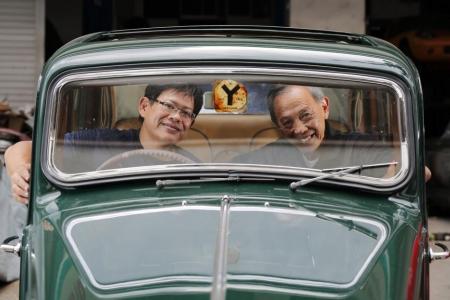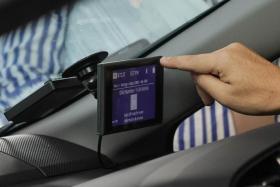Bonding over the classics: Father & son restore pre-Independence roadster
David Chan has spent most of his life (he's 72 now) around cars - building, restoring and racing classic British makes like MG, Lotus and Triumph.
He still owns the motor workshop where he and son Brian painstakingly bring old cars back to life.
It is filled to overflowing with vehicles in various states of repair, with assorted engine parts strewn around seemingly at random.
Mr Chan, who jokes that it wouldn't be a shock to find engine oil running through his veins, still owns the car his grandfather gifted him at 18 - a sure sign in a country that isn't conducive to owning vintage and classic cars that he is more than a mere motoring enthusiast.
That car happens to be an early-model Austin-Healey Sprite dating from the late-1950s, making Mr Chan's story a rare one in modern-day Singapore: he's owned the car since before the nation's independence.
The red two-door roadster, nicknamed "Bugeye" or "Frogeye" because of headlights that appear to pop up above the bonnet, is a relic from a golden motoring age.
He may not have realised it at the time, but the "Bugeye" set the tone and lit a career path for the rest of his life.

For one thing, it serves as the glue that binds Mr Chan to his oldest son Brian, 45, who was also imparted with the love of all things motoring at an early age.
"We're an old-fashioned garage and we still do all the work manually," says the elder Mr Chan of his business David Works Garage, one of a line of small auto workshops in a light-industrial estate in Bedok.
A few doors down is another workshop-cum-garage owned by the Chans, where works-in-progress run the gamut of old British makes from bygone eras like Minis and Morris Minors.
Their business is one of perhaps five auto workshops in Singapore that specialise in servicing and restoring classic cars.
"For me, it's all oil and dirt and dirty fingernails when we work on our cars," says Mr Chan, who currently has about four of his own vehicles in working condition.
He also has a couple of old Datsuns in Malaysia which are used by father and son for classic car events on racetracks there. "It isn't really about who else we're going to beat; it's father-son bonding time where it's either me overtaking him or him overtaking me."
Mr Chan credits his grandfather as the major influence on his motoring life. "He was the first Chinese car distributor to have a showroom in Orchard Road - the business was named Eastern Auto and it was located opposite the Istana."
When his grandfather passed away the business was taken over by one of Mr Chan's uncles, who imported British marques and also enjoyed a career as a racing driver - even winning the Macau Grand Prix in 1958 in an Aston Martin DB3S.
"He was a motorsports hero and left a big impression on me," explains Mr Chan.
"I was born into a family where the daily vocabulary involved words like carburettor and engine oil. I was inspired by an old photograph of my uncle in my dad's house and my goal was to run a garage for motorsports."
His official entry into the motor industry didn't come until 1983, when he left his job as a teacher to open a roadside workshop in front of his parents' Bedok home.
"I was doing general servicing, changing brake pads and so on," he says. He also had a fast-learning young son to serve as first mechanic.

"I've been helping my dad with cars since I was 15, and found that I had a knack for pinpointing, and then fixing, problems," shares Brian, who inherited his first car from his father.
"The gift was a Mk II Mini Cooper when I received my driving licence, but there was a catch: he had taken the car completely apart and I had to build it back first."
On the bright side, he used the opportunity to build it to his own specifications, driving it at local car park rallies before converting it for use as a track car at the Johor circuit.
Brian was also destined to find love through his cars: he met his wife Joan when she bought a Mini from him.
"I gave her a great price and now she's got a lifetime guarantee as well," he says.
"I used to spend seven days at the garage but now Sundays are spent with family. It's just my dad and myself working full-time, the garage is kept small and it's more like a hobby than a business - we're just doing what we enjoy, on a very small scale."
He adds: "We have a close working relationship, and we're usually in agreement when discussing solutions to problems. Two heads are better than one, and it's important to be open-minded."
Says his father: "It's not common that you see a son who's so obedient."
Careful ground-up restorations can take a year or two to complete and a quick glance at a wall-mounted tin box in the garage - containing various sets of old-fashioned car keys - will give visitors some idea of the number of works in progress.
"Time frames vary depending on urgency, parts availability and especially the condition of the cars before work starts," says Brian.
"The most challenging jobs are on pre-war vintage cars because parts are scarce and we often have to fabricate parts to finish the job."
For the Chans, turning a broken-down, rust-encrusted jalopy into a head-turning classic is time-consuming but deeply rewarding, more a labour of love than a lucrative business proposition.
It's their way of keeping motoring heritage alive.
"We are a cottage industry but in the end, driving the cars is the most important thing - it has b very meaningful for us," says David.
Even when old cars are your forte, there are opportunities to show off some contemporary moves.
The elder Chan is currently back at school - drifting school that is, where drivers learn to intentionally oversteer through a corner while maintaining control of the vehicle.
He practises the manoeuvre - first popularised in Japan in the 1970s - in his two Malaysia-registered 1972 Datsun B110 cars.
"I move with the younger crowd nowadays," he says, with a smile and a glint in his eye.
This feature was first published in The Business Times Weekend, Saturday, August 26.
Get The New Paper on your phone with the free TNP app. Download from the Apple App Store or Google Play Store now


